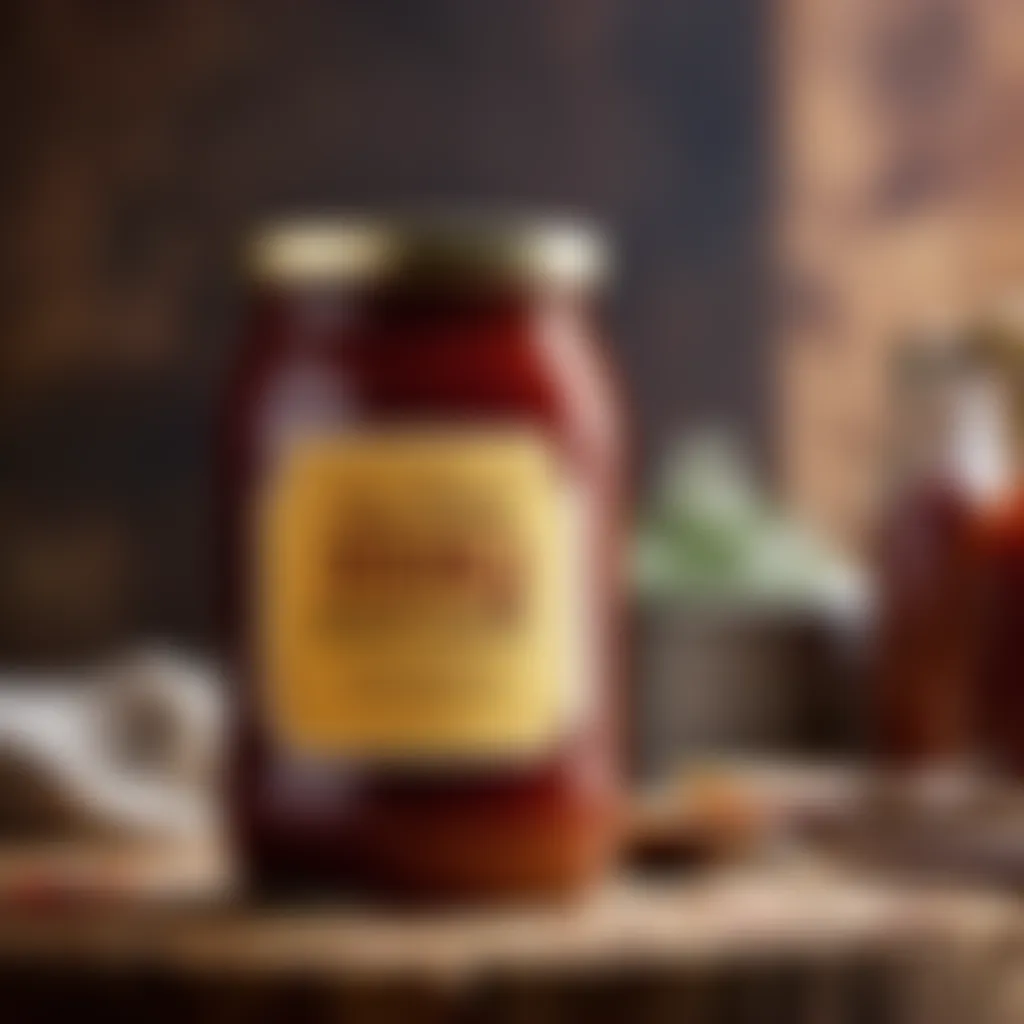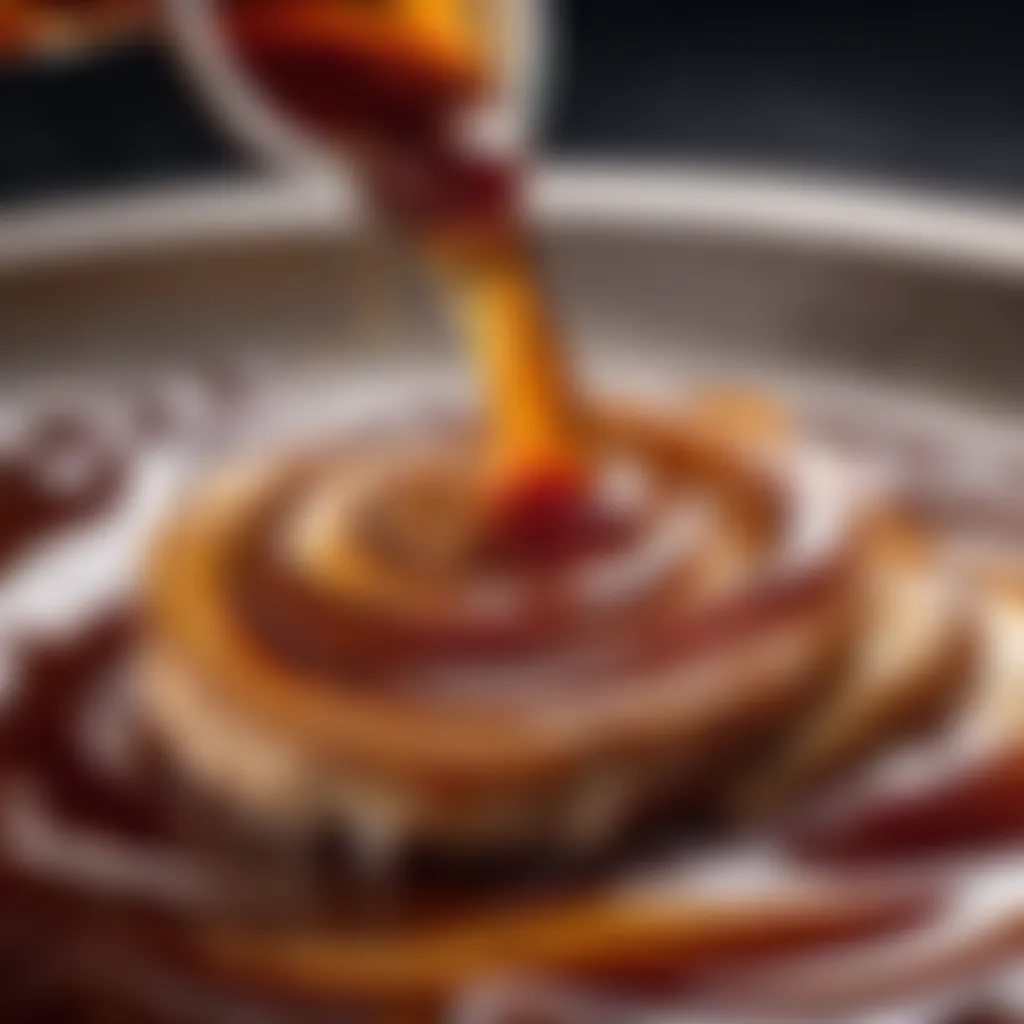Crafting the Ideal North Carolina BBQ Sauce


Intro
In the realm of American barbecue, North Carolina stands as a titan, revered for its distinct interpretation of BBQ sauce. Unlike many other regional sauces, which often lean towards a sweeter or tomato-based profile, North Carolina BBQ sauce is a celebration of vinegar and spice. This article embarks on a detailed exploration of how to craft the perfect North Carolina BBQ sauce. Drawing from centuries-old traditions and culinary techniques, we’ll dive into the essential ingredients, preparation steps, and nuances that distinguish a mediocre sauce from one that sings with flavor.
Before we delve into the nitty-gritty, it’s important to remember that crafting this sauce is as much about personal flair as it is about following tried-and-true methods. Just as different regions of North Carolina have their own take on BBQ, your version can reflect your unique taste while adhering to the core principles of authenticity. Perhaps through this culinary journey, you’ll not only enhance your kitchen prowess but also ignite a passion for this regional gem.
Ingredients:
To get started, let's gather the key ingredients that will form the backbone of your North Carolina BBQ sauce. Quality matters here, so choose the best you can find:
- Apple cider vinegar – 2 cups
- Ketchup – 1/2 cup (optional)
- Brown sugar – 1/4 cup
- Worcestershire sauce – 1 tablespoon
- Yellow mustard – 2 tablespoons
- Red pepper flakes – 1 tablespoon (adjust to taste)
- Black pepper – 1 teaspoon
- Salt – 1 teaspoon
- Onion powder – 1 teaspoon
- Garlic powder – 1 teaspoon
- Hot sauce – 1 teaspoon (adjust to preferred heat level)
These ingredients form a robust foundation. Each component serves a purpose, creating a balance of acidity, sweetness, and heat that is quintessential to a delicious BBQ sauce.
Preparation Steps:
Once you’ve rounded up your ingredients, it’s time to get down to business. Here’s the step-by-step process you’ll want to follow:
- Combine Dry Ingredients: In a mixing bowl, combine the brown sugar, black pepper, salt, onion powder, and garlic powder. Mix them thoroughly to avoid clumping.
- Mix in Liquids: Add apple cider vinegar, ketchup (if using), Worcestershire sauce, yellow mustard, and hot sauce into the dry mix. Stir well until the sugar has dissolved.
- Add Heat: Introduce red pepper flakes to the mixture. This will impart a remarkable heat profile to the sauce. Taste as you go to ensure it matches your liking.
- Simmer: Transfer your concoction into a saucepan over medium heat. Bring it to a gentle simmer, stirring occasionally to prevent sticking.
- Reduce Heat: After reaching a simmer, lower the heat and continue cooking for about 15-20 minutes. This allows flavors to meld beautifully.
- Cool and Store: Remove the sauce from the heat and allow it to cool. Once cool, transfer it to an airtight container for storage.
Technical Aspects:
When working with BBQ sauce, there are several technical aspects that can transform your sauce from commonplace to extraordinary:
- Temperature Settings: Maintain a consistent low to medium heat during the simmering stage. High heat can result in burnt sugars, affecting the flavor negatively.
- Timing Specifics: Allow the sauce to simmer for at least 15 minutes. This ensures that all ingredients have a chance to mingle and develop their profiles.
- Critical Techniques: Stirring frequently while simmering prevents any residue from sticking to the bottom of the pan. This is crucial for maintaining consistency and achieving the desired texture.
Cooking Process:
Let’s break down the cooking process step-by-step:
- Begin by gathering all your ingredients and placing them on your work surface.
- Follow the preparation steps to ensure a well-mixed and flavorful sauce.
- Once the mixture has simmered correctly, remove it from heat and let it cool completely before transferring it to a storage container.
- For the best flavor, let the sauce rest in the refrigerator for at least 24 hours. This aging process enhances all flavors, allowing them to deepen and mature.
Troubleshooting Tips:
Sometimes in the kitchen, things don’t go as planned. Here are a few common issues and solutions:


- Too Sweet: If your sauce is too sweet for your taste, add an extra splash of vinegar to provide balance.
- Too Tangy: If the acidity is overwhelming, increase the sweetness with a bit more brown sugar.
- Lack of Heat: If you prefer more spice, gradually incorporate more red pepper flakes or hot sauce, tasting as you go.
"Cooking is like love. It should be entered into with abandon or not at all."
Each step in this process provides you with not only a delightful BBQ sauce but also a deeper appreciation for the craft of cooking. Enjoy your culinary exploration!
Preface to North Carolina BBQ Sauce
When it comes to Southern cuisine, few dishes evoke a sense of nostalgia quite like barbecue, especially in North Carolina. This state stands as a proud custodian of BBQ tradition, and its sauces are not just condiments; they're a culinary celebration. Every cook and connoisseur here ultimately has a personal favorite, one crafted with care and steeped in local pride.
The richness of North Carolina BBQ sauce lies in its two distinct styles: Eastern and Lexington. Each variation boasts a unique profile, inviting tasters to dive into a pool of flavors that can only be described as a symphony for the taste buds. This region’s BBQ sauce isn't merely about taste; it encapsulates history, culture, and community.
Crafting BBQ sauce is often considered a delicate art form, engaging both amateur cooks and seasoned chefs alike. The process goes beyond mere mixing of ingredients; it requires a deep understanding of what each component contributes to the final flavor. In essence, it’s about balance and harmonizing the elemental tastes, allowing each note to resonate without overshadowing the others.
Why should you care about North Carolina BBQ sauce?
For starters, mastering this sauce means you’re stepping into a whole culinary world that’s been shaped over generations. Whether you're preparing a grilling feast for family gatherings or simply exploring new cooking hobbies, knowing how to craft this sauce is a game changer. Moreover, presenting this iconic sauce can spark conversations, connecting people through shared culinary experiences.
Key considerations to keep in mind include the importance of quality ingredients and an understanding of regional variations. A keen cook will not only experiment with traditional techniques but also make adjustments based on their own palate. This adaptability honors the spirit of BBQ culture – unpretentious and open to personal interpretation.
On that note, remember that crafting the perfect North Carolina BBQ sauce isn’t a race; it’s a journey filled with learning, tasting, and savoring each step along the way. Understanding it requires patience, an eagerness to learn, and, above all, a dash of creativity.
Historical Significance of BBQ in North Carolina
Barbecue in North Carolina is not just about food; it is the fabric of local culture woven through generations. The significance of barbecue, particularly in this southern state, stretches back for centuries, intertwining itself with local customs, traditions, and even social gatherings. As a hallmark of southern hospitality, it reflects a legacy of community and family bonding, making it a profound culinary cornerstone.
The importance of BBQ in North Carolina can be traced back through various epochs of American history. Traditionally, barbecue has been a way to gather friends and family. From backyard picnics to grand celebrations, it always served as a focal point around which stories are shared and memories are forged. Every region within North Carolina boasts its unique flare — an embodiment of local identity.
Now let’s delve deeper into the origins.
Origins of BBQ Culture
The roots of BBQ culture in North Carolina can be found in the agricultural practices and the early settlers’ need to cook efficiently over an open flame. In the 18th and 19th centuries, Native Americans and European settlers began to develop their methods of slow-cooking whole pigs, which is a method still celebrated today. This age-old tradition was not merely about cooking meat; it was about embracing a communal experience.
Barbecue pits became a meeting ground, inviting neighbors and friends. Festivals took shape around these culinary celebrations, highlighting not only the food but also the rich storytelling and rapport between communities. That undeniably laid down a path for BBQ to become an integral part of North Carolina's social fabric.
Evolution Over the Decades


As we move through time, the evolution of BBQ in North Carolina showcases a fascinating journey. It transitioned from a simple method of cooking for sustenance to a celebrated art form. Post-World War II, with the rise of suburban living, barbecue began to shift from communal gatherings to more personal household experiences. People started hosting barbecues at home, giving rise to various styles and regional flavors, particularly in Eastern and Lexington styles.
Moreover, the advent of food festivals saw BBQ go from backyard tradition to a culinary showcase. Events like the Lexington Barbecue Festival highlight the competitive nature of BBQ lovers, drawing in crowds from beyond state lines. In recent years, the emphasis has moved toward authenticity and quality, elevating BBQ from street food to gourmet meals.
In recent times, there's been a shift toward modern interpretations of traditional BBQ, with chefs experimenting with flavors and techniques, blending old world charm with contemporary gastronomy.
"Barbecue isn’t just a meal; it’s a way of life in North Carolina. It has roots in our history and echoes across generations."
Through understanding these historical shifts, one finds that BBQ is more than just meat cooked on a fire; it's about tradition, culture, and community bonding. The BBQ journey in North Carolina serves not only as a celebration of food but as a deep, enriching experience of regional pride and celebration.
Understanding the Types of North Carolina BBQ Sauce
In the spectrum of Southern cuisine, few dishes stir as much passion and tradition as North Carolina BBQ. A significant part of this culinary tapestry is its BBQ sauces, which vary significantly across the state. Recognizing the distinct types of North Carolina BBQ sauce is crucial for those who wish to appreciate its rich diversity. This understanding not only enhances one’s culinary journey but also opens doors to experimenting with flavors and pairings that highlight the unique characteristics of each sauce.
Understanding these sauces enables home cooks, particularly housewives looking to impress at gatherings, to choose the right sauce for specific meats and occasions.
Eastern Style BBQ Sauce
Eastern Style BBQ sauce embodies the essence of tradition in North Carolina's barbecue. Characterized by a vinegar-based blend, this sauce often includes very few ingredients, allowing the vinegar and pepper to shine. With a tangy and slightly spicy profile, it cuts through the richness of slow-cooked pork, enhancing its flavor with each bite.
The simplicity of Eastern Style BBQ sauce is one of its key strengths. Made primarily from vinegar, red pepper, and maybe a hint of salt, it delivers a punch without overwhelming the meat’s natural flavors. Traditionally, it is often paired with whole hog pulled pork and has a strong presence at any authentic Eastern North Carolina BBQ joint.
Here’s how to whip up a basic Eastern Style BBQ sauce at home:
- Ingredients:
- Instructions:
- 1 cup of apple cider vinegar
- 2 tablespoons of crushed red pepper flakes
- 1 teaspoon of salt
- In a mixing bowl, combine the apple cider vinegar with crushed red pepper and salt.
- Whisk together until well mixed.
- Allow it to sit for at least an hour before using to let the flavors meld.
Housewives often find this sauce not just easy to prepare but also incredibly versatile, enhancing everything from pulled pork sandwiches to grilled chicken.
Lexington Style BBQ Sauce
Conversely, Lexington Style BBQ sauce offers a delightful departure towards a sweeter, tomato-based concoction. It incorporates key elements like ketchup or tomato paste, vinegar, and brown sugar, leading to a flavor that balances sweetness with a tangy kick.


This style is central to the Piedmont region's barbeque tradition, typically served alongside pork shoulder or ribs. The inclusion of ketchup makes it appealing to many people, especially those looking for a more familiar flavor.
To craft a home version of Lexington Style BBQ sauce, consider the following:
- Ingredients:
- Instructions:
- 1 cup of ketchup
- 1/2 cup of apple cider vinegar
- 1/4 cup of brown sugar
- 1 tablespoon of Worcestershire sauce
- 1 teaspoon of black pepper
- Combine all ingredients in a saucepan over medium heat.
- Stir until it’s well-blended and starts to bubble.
- Reduce the heat and let it simmer for about 10–15 minutes to thicken slightly.
This sauce not only complements meats beautifully but also makes for an exciting dipping sauce, providing a delightful combo of flavors.
In summary, understanding the types of North Carolina BBQ sauce is fundamental in crafting an authentic BBQ experience. Each sauce has its place and purpose in the cooking landscape, ensuring that BBQ lovers can pull the right flavors from their meats when it matters most. As you explore these unique styles, you’ll add depth and variety to your home cooking, making meals both memorable and rewarding.
Key Ingredients in BBQ Sauce
Creating a stand-out North Carolina BBQ sauce hinges on several fundamental ingredients that intertwine to deliver the signature flavor profile this regional delicacy is known for. Being well-acquainted with these key components is essential to any aspiring culinary expert or home cook. When you understand the interplay of these ingredients, you’re not just slapping together a sauce; you’re elevating your dish.
Vinegar as the Base
Vinegar is the backbone of most North Carolina BBQ sauces, particularly in the Eastern style. Its sharp tang cuts through the richness of the meats, providing a vital contrast that enhances flavor. The most common types of vinegar used are apple cider and white vinegar, each offering its own subtle nuance. It isn’t merely about adding acidity; good vinegar adds a depth that pulls the entire sauce together. Whether used in a marinade or during cooking, vinegar effectively tenderizes meat while infusing it with flavor.
A good rule of thumb is to taste your vinegar before use. Not all vinegars are created equal; some can be overpowering, while others might be too weak. Adjust the quantity based on your preference, but typically, starting with a 1:2 ratio of vinegar to other elements helps balance the sauce well.
The Role of Peppers
Peppers, both hot and mild varieties, play a significant role in shaping the character of BBQ sauce. Hot peppers, such as cayenne or crushed red pepper, bring that well-appreciated heat that complements the smoky flavors of grilled meats. On the other hand, sweet bell peppers can soften the sharp vinegar notes and provide a delicious sweetness that makes the sauce more palatable for various tastes.
Think of peppers as colors on a painter’s palette. You can mix and match to achieve that perfect blend of heat, sweetness, and complexity. If you’re spice-averse, consider experimenting with milder peppers like jalapeños, which impart flavor without overwhelming the palate. Additionally, if you’re into a little kick, don’t hesitate to try adding a dash of hot sauce at the end. It’s a great way to tailor the final sauce to your specific liking.
Sweeteners and Their Variations
While vinegar and peppers lay the groundwork, sugar or other sweeteners can ultimately seal the deal for a well-balanced BBQ sauce. Sweeteners, whether brown sugar, honey, or molasses, are crucial for adding depth and richness to the sauce, softening the sharp acidity from the vinegar, and enhancing overall flavor—think of them as the binding element of the sauce.
When experimenting with sweeteners, consider your target flavor profile. Brown sugar brings a rich, caramel-like flavor, while honey can add floral notes. Each brings its own character, and don’t shy away from blending multiple types. If you’re looking for a healthier alternative, agave syrup can also do the trick without sacrificing taste.
Key Takeaway:
- Balance is essential—combine vinegar, peppers, and sweeteners thoughtfully.
- Experiment and adjust quantities until you achieve the flavor that works for you!







